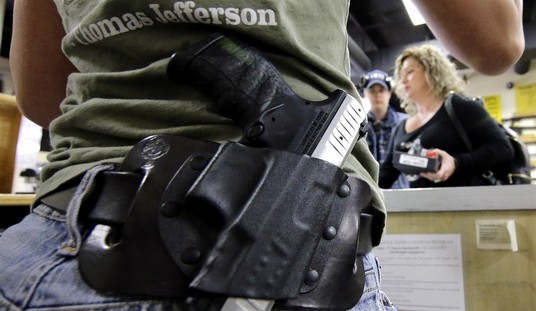
Mexican narco-terrorist cartels armed by the U.S. Bureau of Alcohol, Tobacco, and (Free) Firearms are pouring north across a border that the Obama Administration refuses to secure, and are now boldly threatening American law enforcement officers with death if they dare stand in the way of the cartel surging into Texas:
El Paso police are investigating two mysterious billboards that appeared just off I-10, each with a mannequin hanging from a noose.
“It’s not an advertisement,” said Mike Mons, regional manager for Lamar Outdoor advertising.
The first vandalized billboard off I-10 had Plata o Plomo in large black letters which translates into silver or lead. It is usually a warning targeting police or government officials in Mexico. The warning: work with a cartel and take a bribe or get a bullet.
The hanging mannequin was dressed in a suit and tie.
“This symbol has historically been used by Mexican drug cartels to threaten or intimidate Mexican citizens, business owners and government officials; however, we have never experienced this in El Paso,” said police in a statement released to media.
Pathetically, local police—apparently cowed by the threats—are asserting that the threats are the work of “activists” instead of the cartels.
Investigators suspect it might be the work of an activist group questioning the war on drugs. Similar hanging mannequins were placed on billboards in Las Vegas in 2012 with the messages “Dying for work” and “I hope you’re happy Wall Street.”
That laughably poor explanation falls apart immediately, as the Las Vegas signs seem more in line with the language of the communist “Occupy” movement protesting capitalism, and the El Paso signs echo nearly identical threats made by the cartels just across the border in Juarez.
* * *
While the federal government under Barack Obama is refusing to combat the cartels—which are, after all, heavily armed by firearms that the ATF provided and the DOJ refuses to account for—local police seem to be left largely on their own in the border regions to defend the citizenry as cartels surge across an undefended southern border.
Interestingly enough, Dave Kopel provides the constitutional mechanism to supply the manpower to turn back this tide with or without the support of a corrupt and feckless federal government, in the use of the modern posse comitatus:
From Anglo-Saxon times until the present, a core power of the Sheriff has been the authority to summon posse comitatus–”the power of the county.” Like jury service, posse service is a mandatory duty of the citizen. When the Sheriff, in his nearly unlimited discretion, summons the posse, the citizen must respond. Traditionally, the group responsible for potentially serving in a posse was approximately the same as those responsible for serving in the militia–although the upper and lower age limits for the posse were wider, and the posse had fewer exemptions (e.g., certain professions) than did the militia.
Posse service was a common feature of life in Colonial America and the Early Republic. Like jury service, it was embraced as the right and the duty of a responsible citizen of a republic. Although the authority to summon a posse originated with Sheriffs, it was not limited to them. Justices of the Peace, Judges, and Marshals are among the officials with posse authority. During the ratification debates, some anti-Federalists criticized the proposed Constitution for enumerating a federal militia power, but not a federal posse power; the anti-Federalists feared that a government which had to rely on the militia as a first resort for enforcement would be too militaristic. Alexander Hamilton’s reply (Federalist 29) was that the federal government had posse comitatus authority by virtue of the Necessary and Proper Clause, and this view appears to have been uncontroversial from 1789 onward.
Kopel provides a brief history of how posse comitatus fell out of favor in the East, and provides examples of how it is still actively used by sheriffs in several western states, before noting that the “power of the county” does indeed dovetail with the Second Amendment:
The Second Amendment guarantee of the right of the people to keep and bear arms includes the stated purpose of ensuring the necessary precondition for the existence of a well-regulated militia. The right to arms likewise assures the continuing viability of the posse comitatus. In 21st century America, as in England under the Alfred the Great, the individual’s possession of arms is a right and it is also part of civic duty. Unlike in some other nations (including the modern United Kingdom) where “the governments are afraid to trust the people with arms” (Federalist 46), the American system (like its Anglo-Saxon ancestor) is premised on armed law-abiding citizens participating in the preservation of law and order.
If the federal government continues to fail to protect the southern border from narco-terrorists, it is within the power of the sheriffs to call for posses to legally battle the cartels head-to-head. It is a strategy worth considering, as so far in Mexico, only citizen militias have been effective in battling the cartels.
Update: Corrected the caption. “Plata o Plomo,” translates to “Silver or Lead,” not “Silver or Death,” though the intent in the same.








Join the conversation as a VIP Member